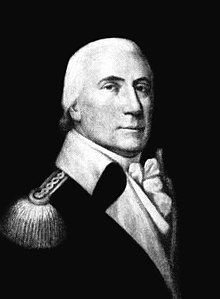North Carolina General Assembly of 1780–1781
| 4th North Carolina General Assembly (1780-1781) | |||||||
|---|---|---|---|---|---|---|---|
| |||||||
| Overview | |||||||
| Legislative body | North Carolina General Assembly | ||||||
| Jurisdiction | North Carolina, United States | ||||||
| Meeting place | 1st New Bern, 2nd New Bern, 3rd Halifax | ||||||
| Term | 1780–1781 | ||||||
| Senate | |||||||
| Members | 50 Senators (50 counties, including Washington District/County) | ||||||
| Speaker | Alexander Martin | ||||||
| Clerk | John Haywood | ||||||
| House of Commons | |||||||
| Members | 106 Representatives authorized (50 counties with 2 each, 6 districts with 1 each) | ||||||
| Speaker | Thomas Benbury | ||||||
| Clerk | |||||||
| Sessions | |||||||
| |||||||
The North Carolina General Assembly of 1780-1781 was the fourth elected legislative body of the State of North Carolina. The assembly consisted of a Senate and House of Commons that met in three sessions in at least two locations in the years 1780 and 1781. Each of the existing 50 North Carolina counties were authorized to elect one Senator and two members of the House of Commons. In addition, six districts (also called boroughs) also elected one House member each.[note 1] The first two sessions were probably held in New Bern, North Carolina in April and September 1780. The third session met in Halifax from January 27, 1781 – February 13, 1781.[note 2][1][2][3][4]
Governor and Councilors of State[]

In 1780, the General Assembly elected Abner Nash as Governor of North Carolina, as was called for in the Constitution of North Carolina. His term of office was extended by an act of the assembly until June 25, 1781.[5]
The North Carolina Constitution of 1776 required "that the Senate and House of Commons, jointly, at their first meeting after each annual election, shall by ballot elect seven persons to be a Council of State for one year, who shall advise the Governor in the execution of his office."[6]
The known North Carolina Council of State members elected by the General Assembly in 1780 included:[7]
Leadership[]

The House of Commons leadership included the following persons:[3]
- Speaker: Thomas Benbury (Chowan County)[10]
- Clerk:
The Senate leadership included the following:[4]
- Speaker: Alexander Martin (Guilford County)
- Clerk: John Haywood (Edgecombe County)
- Assistant Clerk: (Edgecombe County)
House and Senate members[]





New counties created in 1779 included Franklin County, Gates County, Lincoln County, Montgomery County, Randolph County, Richmond County, Rutherford County, Warren County, and Wayne County. Bute County and Tryon County were abolished in 1779. There were no new counties created in 1780 or 1781. There was at least a Senator or one Representative from each county and district.[11][3][4]
Members of the General Assembly were allowed 55 dollars per day for attendance at sessions.[12]
Notes[]
- ^ Not all counties sent two representatives. Some sent none or one.
- ^ The journal for the first two sessions have been lost, so the locations or dates cannot be confirmed.
- ^ a b c He served in the Continental Congress.
- ^ Abner Nash was elected governor on April 20, 1780.
- ^ John Harvey's Wikipedia biography states that he died in 1775, which is verified on NCPedia. Not sure who the John Harvey was in 1780.
- ^ David Whitesides died while in office. William Porter was elected to replace him.
- ^ John Green, Jr. was elected to the Council of State and had to give up his seat. William Blount was elected to replace him.
References[]
- ^ Connor, R.D.D. (1913). A Manual of North Carolina (PDF). Raleigh: North Carolina Historical Commission. Retrieved April 27, 2019.
- ^ Wheeler, John H., ed. (1874). "The Legislative Manual and Political Register of the State of North Carolina". Retrieved April 9, 2019.
- ^ a b c Lewis, J.D. "North Carolina State House 1780". The American Revolution in North Carolina. Retrieved April 17, 2019.
- ^ a b c Lewis, J.D. "North Carolina State Senators 1780". The American Revolution in North Carolina. Retrieved April 17, 2019.
- ^ Nash, Jaquelin Drane (1991). "Abner Nash". NCPedia. Retrieved October 4, 2019.
- ^ "Avalon Project: Constitution of North Carolina". Avalon.law.yale.edu. December 18, 1776. Retrieved November 4, 2019.
- ^ Connor, page 422
- ^ Carraway, Gertrude S. (1991). "Joseph Leech". NCPedia. Retrieved April 8, 2019.
- ^ Littleton, Tucker Reed; Carraway, Gertrude S. "Isaac Guion". NCPedia. Retrieved April 28, 2019.
- ^ Johnson, Elmer D. (1979). "Thomas Benbury". NCPedia. Retrieved April 26, 2019.
- ^ See List of counties in North Carolina for sourcing.
- ^ "Resolution by the North Carolina General Assembly concerning members' salary, North Carolina. General Assembly, May 03, 1780 - May 07, 1780, Volume 15, Page 205". Docsouth.unc.edu. May 3, 1780. Retrieved October 4, 2019.
- ^ Anderson, Jean Bradley (1991). "Stephen Moore". Retrieved November 4, 2019.
- North Carolina General Assembly by session
- 1780 in North Carolina
- 1781 in North Carolina
- Members of the North Carolina House of Representatives
- North Carolina state senators